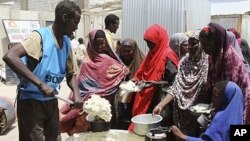The U.N. World Food Program says there are growing concerns over food insecurity in the developing world. Some of those concerns are discussed in a report released to coincide with the commemoration Sunday of World Food Day.
The theme for World Food Day 2011 is “Food Prices - From Crisis to Stability.” A ceremony to mark World Food Day will be held Monday at the headquarters of the U.N. Food and Agriculture Organization in Rome.
Rising food prices, weather emergencies and political instability are deepening the struggle of families trying to provide for their households in many developing nations.
This year’s “State of Food Insecurity in the World” report, published last week, focuses on the impact of food-cost volatility, confirming that high, unpredictable prices are likely to continue.
The report highlighted how poor consumers, small farmers and countries dependent on imports, especially in Africa, have been deeply affected by the food and economic crises.
Gregory Barrow is with the World Food Program in Rome.
“If you look at the places where World Food Program works particularly in developing countries, you see populations of people who might be spending 60, 70, 80 percent of their salaries on purchasing food for their families”.
Barrow added that if prices become volatile and generally start rising, even by a small amount, it means that many of these people are going to struggle to put nutritious food on their tables.
The report also showed that even short-term fluctuations in prices can have a long-term effect on development, and that cutting back on nutritious food in the first 1,000 days of a child’s life can affect mental and physical development and ultimately, future earning capacity.
The United Nations has programs in place aimed at reducing the number of hungry people by one-half by 2015. But most observers agree this target is unlikely to be reached.
UN Launches 2011 World Food Day




